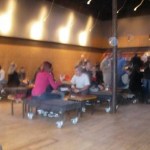science reporting
A run-down of good recent stuff, highly recommended for your weekend reading and bookmarking:
PLoS One: Interview with Peter Binfield:
...In my view PLoS ONE is the most dynamic, innovative and exciting journal in the world, and I am proud to work on it.
In many ways PLoS ONE operates like any other journal however it diverges in several important respects. The founding principle of PLoS ONE was that there are certain aspects of publishing which are best conducted pre-publication and certain aspects which are best conducted post-publication. The advent of online publishing has allowed us to…
Science Online London is next week. I really wanted to go this year, but hard choices had to be made....eh, well.
For those of you who, like me, cannot be there in person, there are plenty of ways to follow the meeting virtually. Follow @soloconf and the #solo09 hashtag on Twitter. Join the FriendFeed room. Check out the Facebook page. And of course there will be a lot of blogging, including in the Forums at Nature Network.
And for those of you who have computers with enough power and good graphics cards, another option is to follow the conference in Second Life - check that link to see how.
The Food hypothesis of human evolution was developed by Richard Wrangham, author of "Catching Fire". It was covered recently by my sciblings, including Erin, Razib and Ethan. It was also the topic on last week's Bloggingheads.tv.
But now, you can hear the interview with Wrangham on the World Science podcast, then go over to the forum and ask him questions. He'll be checking in the forums and responding for the next week or so.
Then let me know what you thought about it - the topic, the podcast, the forum.
[Reminder that I serve as an outside advisor to World Science]
Update: Wow! I did not…
A bunch of interesting Twitterers aggregated in NYC a couple of days ago at the 140 characters conference, discussing various aspects of and uses of Twitter. One of the sessions was about Twitter and Science, led by @thesciencebabe and @jayhawkbabe. I am very jealous I could not be there, but we can all watch the video of their session:
Happy to see the last slide, with @PLoS as one of the recommended Twitter streams to follow for those interested in science.
You may have noticed a couple of days ago that Caryn Shechtman posted an interview with me on the New York blog on Nature Network. Then, Caryn and Erin and I thought it might be a good idea to have the entire interview reposted here, for those who missed it. So, proceed under the fold:
1. What is your professional background?
Even as a little kid I always loved animals and thought that whatever I do when I grow up would have something to do with animals: perhaps work at a zoo or in a circus!. When I was in 6th grade or so, I read the entire series of books by James Herriot and decided to…
The World is a radio show co-produced by WGBH Boston, Public Radio International and BBC. You can probably hear it on your local NPR station - if not, you can find all the shows recorded on the website.
You may remember that I went to Boston a couple of months ago, as part of a team of people helping the show do something special: use the NSF grant they recently received to expand their science coverage and, in collaboration with Sigma Xi and NOVA, tie their radio science coverage to their online offerings.
The result is The World: Science website, a series of weekly science podcasts with…
Later this month, I'll be attending the 59th Meeting of Nobel Laureates in Lindau, Germany. The list of Nobel Laureates (about 20 of them) and the list of about 600 young researchers from 66 countries are very impressive. Of course, not being a chemist, I'll have to do some homework before I go, learning what these people did to get the prizes.
The program certainly looks interesting - there is a lot of "meta" stuff beyond pure chemistry, so I will always find interesting sessions to attend and blog from. Yes, I am going to be there as a blog-reporter. I understand that PZ will also be there…
Last year in May, when I visited Belgrade, I gave interviews with Radio Belgrade, talking about science publishing, Open Access, science communication and science blogging. The podcasts of these interviews - yes, they are in Serbian! - are now up:
Part 1
Part 2
I know that this blog has some ex-Yugoslavs in its regular audience, people who can understand the language. I hope you enjoy the interviews and spread the word if you like them.
Some 47 million years ago, Ida suffocated in the volcanic ashes. I feel the same way at the end of this week - I need to get some air. And some sleep.
But watching the media and blog coverage of the fossil around the clock for a few days was actually quite interesting, almost exhilarating - and there are probably not as many people out there who, like me, read pretty much everything anyone said about it this week. Interestingly, my own feel of the coverage was different if I assumed an angle of a scientist, an angle of an interested student of the changes in the media ecosystem, and an angle…
I am pretty much on record that I would not pay for anything online (to be precise, to pay for content - I certainly use the Web for shopping). But with some caveats. I have been known to hit a PayPal button of people who provide content and information I find valuable. And I would presumably pay, though not being happy about it, if the information behind the pay wall is a) unique (i.e., not found anywhere else by any other means) and b) indispensable for my work (i.e., I would feel handicapped without it).
But I am not subscribed to, or paying for, anything right now and haven't been in…
Just a collection of links to my and other people's posts/articles I need to have collected all in one place (I will explain later):
1.a.Breaking News
Scientific American Editor, President to Step Down; 5 Percent of Staff Cut
'Scientific American' Editor Out in Reorg
1. b.Death of print: how are newspapers and magazines different?
Defining the Journalism vs. Blogging Debate, with a Science Reporting angle
Rosen's Flying Seminar In The Future of News
Thinking the Unthinkable
2020 vision: What's next for news
Newspapers on the brink-where to next?
Could beautiful design save newspapers…
I know it's been a couple of months now since the ScienceOnline'09 and I have reviewed only a couple of sessions I myself attended and did not do the others. I don't know if I will ever make it to reviewing them one by one, but other people's reviews on them are under the fold here. For my previous reviews of individual sessions, see this, this, this, this and this.
What I'd like to do today is pick up on a vibe I felt throughout the meeting. And that is the question of Power. The word has a number of dictionary meanings, but they are all related. I'll try to relate them here and hope you…
You know I have been following the "death of newspapers" debate, as well as "bloggers vs. journalists" debate, and "do we need science reporters" debate for a long time now. What I have found - and it is frustrating to watch - is that different people use different definitions for the same set of words and phrases. "News", "reporting", "media", "press", "journalism", "Web", "Internet", "blog", "citizen journalist", "newspapers", "communication", etc. are defined differently by different people. Usually they do not explicitly define the terms, but it is possible to grasp their definition from…
Check out the show's web page:
Fifteen thousand years ago North America was like the Serengeti on steroids, with mega-creatures roaming a continent teeming with incredible wildlife. But then, in a blip of geologic time, somewhere between 15 and 35 magnificent large types of animals went extinct. In a television exclusive, NOVA joins forces with prominent scientists to test a startling theory that may finally explain the Last Extinction, on Tuesday, March 31 at 8pm ET/PT on PBS (check local listings). The program features scientists representing all sides of this debate.
Tomorrow's Nature has a nice, long article about the plight of science journalism and the potential role of science blogs in filling the void as science journalists are laid off and the news-media are going bankrupt and shutting down.
No commentary for me about it yet today - I hope others will start first.
The introductory editorial is here: Filling the void: As science journalism declines, scientists must rise up and reach out.
The main article is here: Science journalism: Supplanting the old media? (allows comments)
The PDF is really pretty (and has additional images and boxes in the…
From SCONC:
Thursday, March 19
6pm
SCONC night at the Museum of Life and Science. Join your fellow science communicators for refreshments, socializing and a bit of brainstorming about Science in the Triangle - the museum's evolving experiment in community science journalism and scientific-community organizing.
Our host, Troy Livingston, MLS Vice President of Innovation and Learning is seeking SCONC input about ways the group can become involved in community building activities at the site and at the Museum. So get those neurons moving and bring your ideas!
There's plenty of free parking.…
Check out the SEEDMAGAZINE.COM. W00t! Looks nifty!
What they say:
Our online magazine team has been hard at work creating a new look for SEEDMAGAZINE.COM, the magazine's homepage. As you'll see, it has a ton of new features and pretty new colors.
The content of the site is now divided into four departments with subcategories in each, which makes for a total of 11 areas of coverage. The departments are: World (politics, development and environment), Ideas (findings and theory), Innovation (technology, design and business) and Culture (books, art and events). You can go straight to one…
Still recovering. Flights were smooth. I finally finished Jennifer Rohn's book on the airplane. I hated my Chapel Hill neighbors, lounging at the pool in 78F, as I was leaving for the cold, snowy Boston. But now I'm back.
The first night, a bunch of us went to the Science Cafe and discussed the possibility of intelligent life in the Universe and methods to find them if they are out there.
And had some dinner as well...
On Monday, we gathered at WGBH station, in a nice, modern, green building, and about 20 of us discussed the PRI/BBC/NOVA/SigmaXi/WGBH/World project: how to build an online…
Karen Ventii, a former SciBling and now a science writer, wonders:
As a medical writer, I've noticed that most medical writers I meet are female. A quick Google search using the keywordsâ "freelance medical writerâ" produced seven female and three male writers (approx. 2:1 ratio) from the first 10 eligible results.1 While it is difficult to draw statistically relevant conclusions from such a small sample size, it certainly implies a trend.
The American Medical Writers Association is the leading professional organization for medical communicators, with over 5,500 members from around the world…

